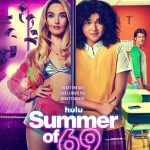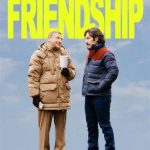An insomniac musician encounters a mysterious stranger, leading to a journey that challenges everything he knows about himself.
Chuck says:
The very definition of a vanity project, Trey Edward Shults’ “Hurry Up Tomorrow” is a pretentious, misguided-from-the-word-go dive into the psyche of its star Abel Tesfaye, A.K.A. The Weeknd. This extended therapy session is ego messaging of the highest order, a narcissistic, woe-is-me examination of the trials and tribulations that come from being an international pop star and the emotional toll that results.
The narrative ground covered here has already been well-trod thanks to fictional accounts and biopics taking place in the music world. However, this doesn’t prove daunting to Shults who endeavors to juice this material by taking a self-consciously arty approach to the material. This implodes spectacularly as his constant use of camera tricks make for a distracting collection of aesthetic choices that create confusion rather than enlightenment.
The Weeknd seemingly has everything an aspiring pop star could want. Fame, fortune, access to copious amounts of drugs and women, an entourage to cater to his every whim and a manager, Lee (Barry Keoghan), bent on maintaining his success are all readily at hand. But gosh darn it, the superstar just isn’t happy, plagued by inner demons and a broken heart, the love-of-his-life just having left him. These troubles have contributed to his no longer being able to sing, something an astute doctor points out, is likely psychosomatic.
Though spiraling out of control, Lee forces the singer to maintain his tour schedule, which proves disastrous as he eventually melts down on stage. However, a MOMENT occurs before he scuttles backstage, his eyes meeting those of Anima (Jenna Ortega), a deeply invested fan. An immediate connection is made between the damaged, star-crossed lovers and through some convenient plotting, the meet up backstage and decide to run off together.
In addition to the simplistic plotting, what makes the film such an arduous experience to sit through is Shults’ approach. With the notable exception of s tripod, I’d be hard-pressed to name a tool in his director’s bag he doesn’t employ. His camera glides and twirls throughout, 360-degree moves are used ad nauseam coupled with strobing light effects, while rapid cutting is used throughout as are blurring effects, fades, color changes, distorted sound, etc. The cumulative effect is a disservice to the threadbare story, the end result akin to an assault on the viewer. You don’t watch this film so much as try to survive it.
The self-conscious approach to making an “art” film extends to the plot, such as it is. Events relating to the trauma The Weeknd has endured are purposely vague, while the symbolism that’s employed is obvious and heavy-handed. “Anima” is an obvious giveaway as to the purpose of Ortega’s character, while a descent into the bowels of a deserted hotel (to sublevel 6!) mirrors the singer’s entering his own personal hell. Really deep stuff here, man…
As for the three principals, Ortega is the most committed, her performance consisting of a great deal of crying, pensive looks and some really enthusiastic singing and dancing. It’s a misguided effort but at least it’s an energetic one. As for the always reliable Keoghan, he does what he can with the stereotype he’s saddled with. The fact that he’s in the film leads me to believe he likely lost a bet of some sort. As for Tesfaye, he shouldn’t give up his day job. He’s impassioned but obvious at every turn, and while I have never seen him in concert, I hope he shows a bit more energy while on stage. Here, he exudes the charisma of a post.
“Hurry Up Tomorrow” is the sort of movie that makes you wonder just how it got made. I’m assuming its modest budget of $15 million was seen as a small risk to keep Tesfaye happy, and perhaps this experience helped him work through some of his issues. The problem is, I now must deal with trauma of my own, having sat through this self-indulgent mess.
Zero Stars




